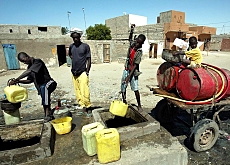
Green cities offer vision for the future

The challenges faced by cities, such as environmental damage and shrinking resources, are to be addressed at a conference in Geneva.
S-DEV Geneva 05, which gets underway on Tuesday, will examine what 25 “green” cities from around the world are doing to achieve sustainable urban development.
According to the organisers, two-thirds of the world population – six billion people – will live in cities by 2050. This compares with half the global population in 2007 and a third in 1950.
This development is expected to put huge pressure on infrastructure such as transport, housing, health, waste and sanitation.
The Swiss Agency for Development and Cooperation (SDC), which is supporting the conference, has described this urban phenomenon as “the challenge of the 21st century”.
“We do not have to be reminded of the alarming statistical forecasts regarding urban development,” said Walter Fust, director of the SDC.
“But looking at it from a more positive angle, cities are also the engine of economic growth, social change and cultural diversity.”
Developing countries
The conference, which is expected to attract more than 1,500 mayors, public service officials, entrepreneurs and research workers, brings together cities from both industrialised and developing countries.
The Swiss cities of Basel, Geneva and Zurich will be presenting projects on renewable energy, public transport and regeneration.
Mauritania’s capital Nouakchott will outline efforts to transform its shantytowns, while Rufisque in Senegal will describe how a low-cost sanitation project has seen malaria, cholera and diarrhoea among children practically disappear.
The SDC says cities in the North tend to be scarred by wasteful use of natural resources and unsustainable consumer habits, while those in the South suffer declines in living environments, growing poverty and a lack of public resources to meet emergencies.
But Fust believes that solutions to sustainable development can and must be sought jointly in all countries, regardless of their wealth.
“The cities of the South, which are often forced to come up with inventive solutions when faced with emergency or survival situations, can suggested innovations of interest to cities of the North,” he said.
swissinfo
S-DEV Geneva 05, which is sponsored by the United Nations, runs from October 11-13.
More than 1,500 participants are expected to attend.
Themes to be covered include sustainable urban planning, pollution, transport, and housing and development.
Among the cities taking part are: Autlan (Mexico), Bogota (Colombia), Belo Horizonte (Brazil), Dar es Salaam (Tanzania), Goa (India), Irbid (Jordan), Karachi (Pakistan), Kunming (China), Koudougou (Burkina Faso), Havana (Cuba), Lleida (Spain), Moscow (Russia), Mumbai (India), Nam Dinh (Vietnam), Rosario (Argentina), Uzice (Serbia), Vancouver (Canada) and Växjö (Sweden).

In compliance with the JTI standards
More: SWI swissinfo.ch certified by the Journalism Trust Initiative




























You can find an overview of ongoing debates with our journalists here . Please join us!
If you want to start a conversation about a topic raised in this article or want to report factual errors, email us at english@swissinfo.ch.